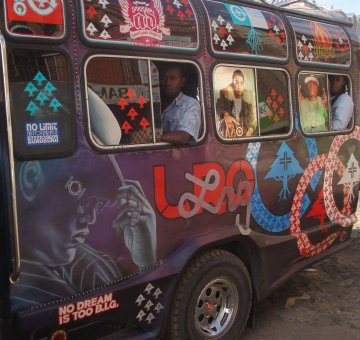Seminar: 'Making it in Nairobi: Matatu Culture and Political Economy in the New Africa'
 Matatus (mini buses) provide transport for about 70 percent of Nairobi’s population and the sector is one of the largest in Kenya. The matatu industry is the only major business in the country that has not been infiltrated by foreign aid or foreign-aid workers and it has been evolving and thriving since the 1950s. The research discussed in this seminar on 21 November focuses on the social, economic, cultural and political history of matatus and how they have become so deeply rooted in Kenyan life. Kenda Mutongi, author of Making it in Nairobi: Matatu Culture and Political Economy in the New Africa (forthcoming) examines all the people involved in this success since the late 1950s from the conductors to the passengers, owners, politicians and criminal groups, among others.
Matatus (mini buses) provide transport for about 70 percent of Nairobi’s population and the sector is one of the largest in Kenya. The matatu industry is the only major business in the country that has not been infiltrated by foreign aid or foreign-aid workers and it has been evolving and thriving since the 1950s. The research discussed in this seminar on 21 November focuses on the social, economic, cultural and political history of matatus and how they have become so deeply rooted in Kenyan life. Kenda Mutongi, author of Making it in Nairobi: Matatu Culture and Political Economy in the New Africa (forthcoming) examines all the people involved in this success since the late 1950s from the conductors to the passengers, owners, politicians and criminal groups, among others.
 Kenda Mutongi was born and raised in a small village in western Kenya. She attended Coe College and then the University of Virginia where she earned a PhD in African history. Mutongi has published articles in the main African Studies journals. She is also the author of two books: Worries of the Heart: Widows, Family, and Community in Kenya (University of Chicago Press, 2007), which received an Honorable Mention from the African Studies Association’s Melville J. Herskovits Award for the best scholarly book on Africa in any discipline, and Making it in Nairobi: Matatu Culture and Political Economy in the New Africa (forthcoming). Mutongi has served as chair of the Africana Studies and the Africa/Middle Eastern Studies Programs. She has also been a member of the Institute for Advanced Study in Princeton, and a fellow at Radcliffe Institute for Advanced Study at Harvard. She recently accepted a position as a member at the Netherlands Institute for Advanced Study for the 2013/14 academic year. See her profile.
Kenda Mutongi was born and raised in a small village in western Kenya. She attended Coe College and then the University of Virginia where she earned a PhD in African history. Mutongi has published articles in the main African Studies journals. She is also the author of two books: Worries of the Heart: Widows, Family, and Community in Kenya (University of Chicago Press, 2007), which received an Honorable Mention from the African Studies Association’s Melville J. Herskovits Award for the best scholarly book on Africa in any discipline, and Making it in Nairobi: Matatu Culture and Political Economy in the New Africa (forthcoming). Mutongi has served as chair of the Africana Studies and the Africa/Middle Eastern Studies Programs. She has also been a member of the Institute for Advanced Study in Princeton, and a fellow at Radcliffe Institute for Advanced Study at Harvard. She recently accepted a position as a member at the Netherlands Institute for Advanced Study for the 2013/14 academic year. See her profile.

